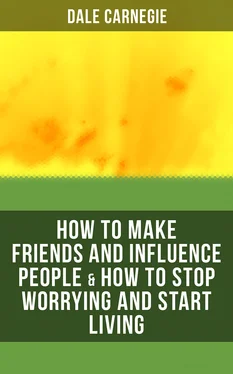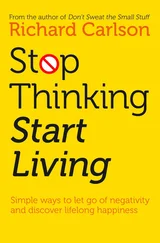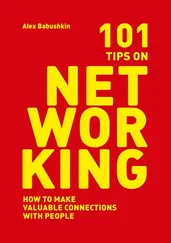Dale Carnegie
HOW TO MAKE FRIENDS AND INFLUENCE PEOPLE & HOW TO STOP WORRYING AND START LIVING
Published by
 Books
Books
Advanced Digital Solutions & High-Quality eBook Formatting
musaicumbooks@okpublishing.info2017 OK Publishing ISBN 978-80-272-2264-3
How To Make Friends And Influence People
How to Stop Worrying and Start Living
How To Make Friends And Influence People
Table of Contents
Twelve Things This Book Will Do For You
Preface: How This Book Was Written And Why
Part 1 - Fundamental Techniques In Handling People
Chapter 1 - "If You Want To Gather Honey, Don't Kick Over The Beehive"
Chapter 2 - The Big Secret Of Dealing With People
Chapter 3 - "He Who Can Do This Has The Whole World With Him. He Who Cannot Walks A Lonely Way"
Part 1 In A Nutshell
Part 2 - Six Ways To Make People Like You
Chapter 1 - Do This And You'll Be Welcome Anywhere
Chapter 2 - A Simple Way To Make A Good First Impression
Chapter 3 - If You Don't Do This, You Are Headed For Trouble
Chapter 4 - An Easy Way To Become A Good Conversationalist
Chapter 5 - How To Interest People
Chapter 6 - How To Make People Like You Instantly
Part 2 In A Nutshell
Part 3 - Twelve Ways To Win People To Your Way Of Thinking
Chapter 1 - You Can't Win An Argument
Chapter 2 - A Sure Way Of Making Enemies – And How To Avoid
Chapter 3 - If You're Wrong, Admit It
Chapter 4 - A Drop Of Honey
Chapter 5 - The Secret Of Socrates
Chapter 6 - The Safety Valve In Handling Complaints
Chapter 7 - How To Get Cooperation
Chapter 8 - A Formula That Will Work Wonders For You
Chapter 9 - What Everybody Wants
Chapter 10 - An Appeal That Everybody Likes
Chapter 11 - The Movies Do It. TV Does It. Why Don't You Do It?
Chapter 12 - When Nothing Else Works, Try This
Part 3 In A Nutshell
Part 4 - Nine Ways To Change People Without Giving Offence Or Arousing Resentment
Chapter 1 - If You Must Find Fault, This Is The Way To Begin
Chapter 2 - How To Criticize-And Not Be Hated For It
Chapter 3 - Talk About Your Own Mistakes First
Chapter 4 - No One Likes To Take Orders
Chapter 5 - Let The Other Person Save Face
Chapter 6 - How To Spur People On To Success
Chapter 7 - Give A Dog A Good Name
Chapter 8 - Make The Fault Seem Easy To Correct
Chapter 9 - Making People Glad To Do What You Want
Part 4 In A Nutshell
Part 5 - Letters That Produced Miraculous Results
Part 6 - Seven Rules for Making Your Home Life Happier
Chapter 1 - How To Dig Your Marital Grave In The Quickest Possible Way
Chapter 2 - Love And Let Live
Chapter 3 - Do This And You'll Be Looking Up The Time-Tables To Reno
Chapter 4 - A Quick Way To Make Everybody Happy
Chapter 5 - They Mean So Much To A Woman
Chapter 6 - If You Want To Be Happy, Don't Neglect This One
Chapter 7 - Don't Be A "Marriage Illiterate"
Part 6 In A Nutshell
Twelve Things This Book Will Do For You
Table of Contents
Get you out of a mental rut, give you new thoughts, new visions, new ambitions.
Enable you to make friends quickly and easily.
Increase your popularity.
Help you to win people to your way of thinking.
Increase your influence, your prestige, your ability to get things done.
Enable you to win new clients, new customers.
Increase your earning power.
Make you a better salesman, a better executive.
Help you to handle complaints, avoid arguments, keep your human contacts smooth and pleasant.
Make you a better speaker, a more entertaining conversationalist.
Make the principles of psychology easy for you to apply in your daily contacts.
Help you to arouse enthusiasm among your associates.
Preface: How This Book Was Written And Why
Table of Contents
During the first thirty-five years of the twentieth century, the publishing houses of America printed more than a fifth of a million different books. Most of them were deadly dull, and many were financial failures. "Many," did I say? The president of one of the largest publishing houses in the world confessed to me that his company, after seventy-five years of publishing experience, still lost money on seven out of every eight books it published.
Why, then, did I have the temerity to write another book? And, after I had written it, why should you bother to read it?
Fair questions, both; and I'll try to answer them.
I have, since 1912, been conducting educational courses for business and professional men and women in New York. At first, I conducted courses in public speaking only - courses designed to train adults, by actual experience, to think on their feet and express their ideas with more clarity, more effectiveness and more poise, both in business interviews and before groups.
But gradually, as the seasons passed, I realized that as sorely as these adults needed training in effective speaking, they needed still more training in the fine art of getting along with people in everyday business and social contacts.
I also gradually realized that I was sorely in need of such training myself. As I look back across the years, I am appalled at my own frequent lack of finesse and understanding. How I wish a book such as this had been placed in my hands twenty years ago! What a priceless boon it would have been.
Dealing with people is probably the biggest problem you face, especially if you are in business. Yes, and that is also true if you are a housewife, architect or engineer. Research done a few years ago under the auspices of the Carnegie Foundation for the Advancement of Teaching uncovered a most important and significant fact - a fact later confirmed by additional studies made at the Carnegie Institute of Technology. These investigations revealed that even in such technical lines as engineering, about 15 percent of one's financial success is due to one's technical knowledge and about 85 percent is due to skill in human engineering-to personality and the ability to lead people.
For many years, I conducted courses each season at the Engineers' Club of Philadelphia, and also courses for the New York Chapter of the American Institute of Electrical Engineers. A total of probably more than fifteen hundred engineers have passed through my classes. They came to me because they had finally realized, after years of observation and experience, that the highest-paid personnel in engineering are frequently not those who know the most about engineering. One can for example, hire mere technical ability in engineering, accountancy, architecture or any other profession at nominal salaries. But the person who has technical knowledge plus the ability to express ideas, to assume leadership, and to arouse enthusiasm among people-that person is headed for higher earning power.
In the heyday of his activity, John D. Rockefeller said that "the ability to deal with people is as purchasable a commodity as sugar or coffee." "And I will pay more for that ability," said John D., "than for any other under the sun."
Wouldn't you suppose that every college in the land would conduct courses to develop the highest-priced ability under the sun? But if there is just one practical, common-sense course of that kind given for adults in even one college in the land, it has escaped my attention up to the present writing.
Читать дальше

 Books
Books










